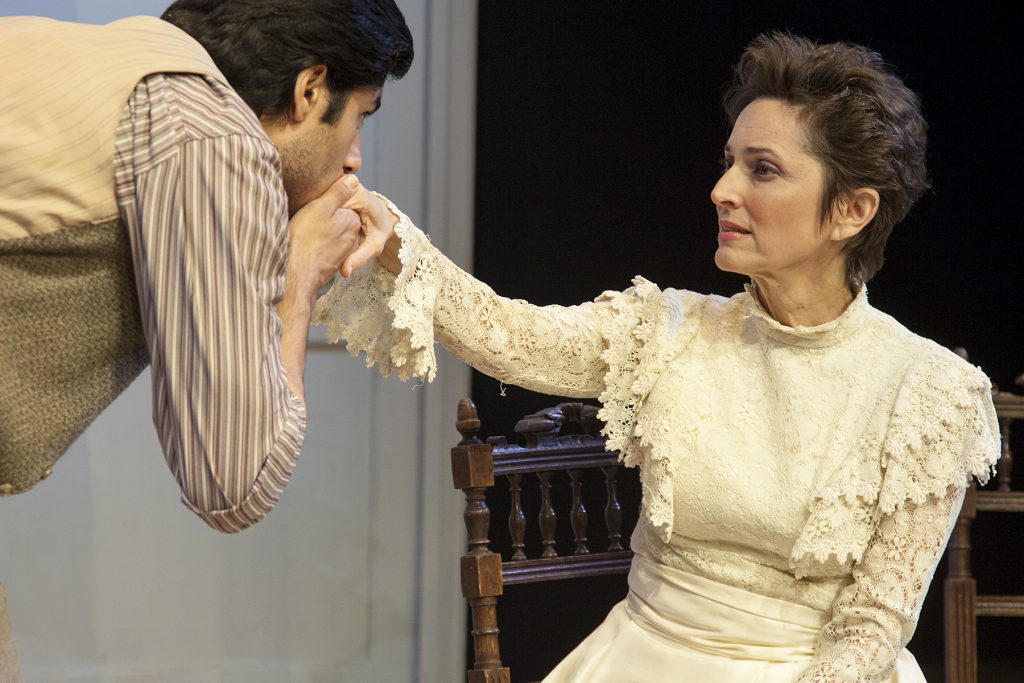“Three Days in the Country” is a comedy — until it’s a tragedy. Antaeus Theater Company production is an adaptation of Ivan Turgenev’s grueling four-and-a-half hour “A Month in the Country.” Turgenev might be known as a contemporary of Chekhov (more of a household name than the former), but Turgenev’s work in fact predates many of Chekhov’s works by decades. Like Chekhov plays of the same nature, “Three Days” dutifully includes a cast of entirely too many characters for a modern play, but in that ever-so Chekhovian way, it paints a complete portrait of lust, love and longing without needing to write in a drop of expositional information. With “Three Days,” director Andrew Paul and Antaeus Theater Company takes regional theater to a whole new level: sucking you into the carefully crafted 19th century Russian world, relating to audience members with timeless woes of startling secrets, endless desire and unrequited love — and then smashing it all in your face and ripping it to pieces by the end.
“Three Days in the Country” is partner cast, which means that two different sets of casts perform the same play on different days (I saw the “Blunderers” cast, the other being “Assassins”). In the program, I discovered that all Antaeus productions are partner cast — a unique tradition not commonly seen in professional theatrical productions. Whether the partner casting does make a difference in the performance, I can’t say — but Antaeus seems to live by this philosophy, and I respect that.
Natalya (Nike Doukas) plays the matriarch of the wealthy household — her protagonist role becoming clear by about 30 minutes in — endlessly pursued by her longtime friend Rakitin (Leo Marks), but she does not return his romantic love. Natalya’s clueless husband and Rakitin’s old friend Arkady (Antonio Jaramillo) spends most of his time tending to his land and thousands of serfs. This leaves Natalya, their son Kolya (Elijah Justice), and various other tutors, staff members and floating wealthier members of society with no stated relation to the family to their own devices.
If you’ve never seen a Chekhov play or a play in a Chekhovian style, it takes a bit of getting into, but once immersed, you won’t ever leave. Unlike Shakespeare, it isn’t the language that contemporary audiences might stumble over — instead, it’s the complicated character dynamics. Characters butt into conversations and mill from room to room in long, sweeping scenes, timing just perfect enough for plenty of complicated permutations. In “Three Days,” a main problem is hinted at ever so delicately by Paul but never given true weight until the very end of Act I — Natalya has fallen in love with the handsome, young tutor, Belyaev (Peter Mendoza). At first, I thought that picking up on the subtlety of this implication simply indicated that I was reading too far into the script, but I was pleasantly surprised to be incorrect.
Naturally, this results in disastrous yet hysterical scenarios — Rakitin and Arkady have shockingly different reactions, the former angry and frustrated and the latter relatively fatigued and uncaring. Yet “Three Days” doesn’t just stop there — plenty of other people are pulled into the mess, including Natalya’s young ward Vera (Jeanne Syquia) who is courted by the kind but completely bumbling old man Bolshintsov (Gregory Itzin). A delightfully comedic scene involving raspberries pulls unlikely comrades Rakitin, clever but con-artist doctor Shpigelsky (Armin Shimerman) and Bolshintsov together, reveling in rejected-white-man sorrow.
“Three Days” could almost be described as a soap opera with class — in more ways than one. The play quickly turns alarmingly serious as Natalya’s infatuation with Belyaev is clearly impossible to fulfill, given that she is a wealthy woman and Belyaev is but a lowly staff member of her huge estate brought on to tutor Kolya, who is consistently devoid of attention from Arkady. “Three Days” turns sour slowly but surely, laying the groundwork for an explosive ending that really only has one possible ending — more sorrow.
Doukas plays Natalya with a beautiful balance of put-togetherness and hidden on-edge anxiety, while Marks stands out as the relatable Rakitin, loyal but ignored, enviously witty and well-dressed. Shimerman and Lily Knight (who plays the simple but pragmatic Lizaveta) also steal the show with a scene that mixes both physical and verbal comedy, highlighting potentially still-relevant scenarios of marrying for utility or love.
Scenic design by Se Hyun Oh is simple but realistic, and paired with costume design by A. Jeffrey Schoenberg, “Three Days” turns into an elegant affair, transporting audience members to actual 19th century Russia. It’s not quite a stripped down production, but it’s pared down enough to let the dialogue shine through without the need for excess decoration and fluff to impair the acting and directing (although a contraption that made a kite “fly” was a nice touch).
“Three Days in the Country” may not have any exact contemporary parallels, but what’s relevant is Natalya’s naive and incorrect belief that she could break out of a societal box, despite being an upper class citizen. Comfortable country life isn’t all that it seems or all that it’s cut out to be — a commentary-at-large at the changing economic statuses at the time the original play was written (1872) alongside shifting ideals in today’s divide of uber-wealthy and otherwise. It’s a stomach-churning moment when Natalya cries out, discovering that her loveless marriage with her rich husband must continue over her whirlwind minute-long romance with her staff member. She realized that she had more love in that one minute than her husband has given her his entire life. We are all but molds of life around us, playing a game and putting on a facade that we can’t get rid of; every character in “Three Days” wants something, and nearly every character fails to get it. That’s life, I guess — and “Three Days in the Country” delivers that message, strong and clear.
Contact Olivia Popp at oliviapopp ‘at’ stanford.edu.
